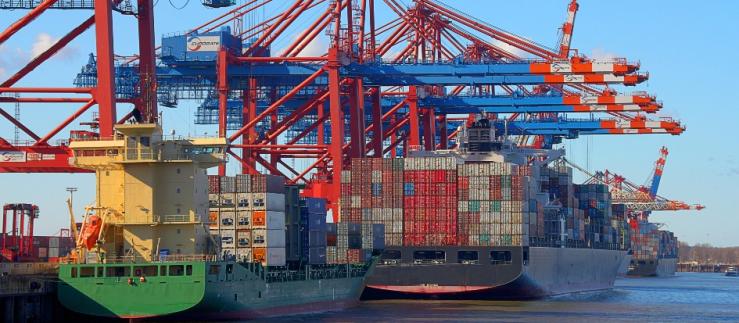“Realigning trade flows” is the theme of this year’s International Trade Forum, set to take place on April 26, 2023 in Lausanne. Aren’t there more pressing issues for Swiss SMEs? Is now really the time for them to be taking an interest in geopolitics?
Swiss SMEs are constantly facing huge challenges, such as the latest trends in the global economy, supply shortages or evolving structures in their markets. But all of these issues are directly linked to geopolitical developments, to a greater or lesser extent. From the many conversations I’ve had with businesspeople over the past few months, I know that SMEs are really grappling with this issue.
You hear a lot about problems caused by disrupted trade flows. Are there winners in the current situation, too?
Wars are bad for business. Nobody wins in these situations. Think of the Russian invasion: the shortages in the supply of energy and agricultural raw materials caused by the crisis are having a negative impact on the global economy. That’s why it’s important to create resilient supply chains, with turbulent times in mind. Despite major deadlocks, this approach has worked relatively well so far. When you look back at the past three years, the global economy has proven pretty resilient.
What do you make of developments in global trade this year?
At the moment we’re looking at structural and economic uncertainty alike. It’s all coming together at once: shocks, war, geopolitical tension, inflation, uncertain economic developments. That’s very rare.
I think economists are feeling unsettled. If you believe the experts, 2023 could be a tough year for the economy. Global trade is set to grow by around 1%, the Eurozone 0.5% and the US 1%. I hope to know more in spring about whether these predictions of sluggish momentum are accurate or if we can come out of the downturn quicker.
But there are markets with better prospects: Asia, the Middle East and Africa will see more growth, according to these forecasts.
Are we seeing more of a new bloc mindset in the economy now?
Yes and no: the geopolitical developments are seeing Asian countries – at least China – act like more of a hegemony. At the same time, trade there is being liberalized by two mega treaties. The ASEAN countries are also working to expand their cooperation. Africa is a huge emerging area for free trade. Things are looking very positive in this region, as barriers are being removed.
At the same time – and that’s what worries me most – we’ve seen a deterioration on the multilateral level: the WTO has been weakened. No major WTO rounds have been completed forthe past two decades, although multilateral liberalization works best for everyone. Having said that, it’s always been the case that global trade flows have existed alongside regional ones, which were usually stronger and more dynamic. An important task now lies in making sure the global economy doesn’t collapse into three or four big blocs over the next 10 to 15 years. That would be bad for all involved.
What’s the current state of play for Swiss SMEs?
SMEs are severely impacted by state interventions that limit trade, as they’re dependent on international market access. That’s why it’s important not to constantly change conditions and make them tougher. The majority of state-level measures straitjacketing trade are export subsidies. It’s hard for SMEs to survive and grow on markets if their competitors are partly subsidized by the state.
But many Swiss companies have great success in the export business. Why is that?
Almost every company that exports offers great products. They make sure they stay at the forefront of the innovation cycle.
There are many signs that SMEs are doing very well for themselves. Lots are niche players who only have one or two competitors worldwide. These global champions have good prospects. Swiss SMEs aren’t moaning and groaning: they’re getting on with it and doing what’s necessary.
Can re-shoring and near-shoring be a way for SMEs to circumvent the tricky geopolitical situation?
For resource-related reasons, SMEs usually start their globalization journey in neighboring regions – for Swiss companies, that’s Europe. Then, depending on technology or their industry, they move onto other markets in America and Asia.
But there are industries where that won’t fly. As a successful niche player with unique technologies, you can and must start supplying markets in Asia and America relatively quickly in order to grow. That’s very challenging for SMEs, as setting up your own branch in Asia, say, takes a lot of effort and resources, particularly when it comes to management and capital.
How can the Swiss government offer more help to SMEs?
There are various tools. It’s about the framework conditions. Something that eases an administrative burden on thousands of SMEs is the lifting of import tariffs on industrial goods as of January 1, 2024. Free trade agreements are also extremely valuable and offer additional safeguards against protectionist measures, too. We have to maintain our network of free trade agreements by reviewing existing treaties and concluding new ones. For instance, I’m thinking of the South American market with Mercosur, the US or India.
The home front matters, too: securing macroeconomic stability, promoting exports and tourism or taking measures to tackle a skills shortage. Switzerland as a hub of innovation is key for SMEs too, as they’re dependent on the innovative strength of Switzerland’s business sector.
The full title of this year’s International Trade Forum is: “Realigning trade flows: Chaos or opportunity”. We’ve all seen the chaos – what about the opportunities?
I see two or three different levels: one is vertical or horizontal integration projects. Horizontally, you can buy something up, enter into joint ventures or bring teams on board at your own company. Vertically, you can opt for takeovers in the supply chain or the sector, or grow yourself. New opportunities are opening up where partners or competitors might previously have said no from a position of strength.
Industrial enterprises are also seeing a rethink in terms of operations. Until the pandemic broke out, the idea was to keep small levels of stock and not lock too much working capital into intermediate products. Today, however, increasing supply capacity with a bigger buffer can be an attractive option. Of course, it costs money. Depending on the company, though, it could lead to picking up a contract because you’re able to deliver the goods. But it takes close collaboration with clients to find out whether orders will actually start coming in.
Thirdly – and this is where Swiss SMEs often have a huge advantage – companies which are well-financed are often more resilient in a crisis. Swiss companies usually have a lot of equity. In hard times, that’s a huge advantage. The same goes for having banks that play their part and continue to provide loan capital. That’s strategically useful for SMEs when things get tough.








